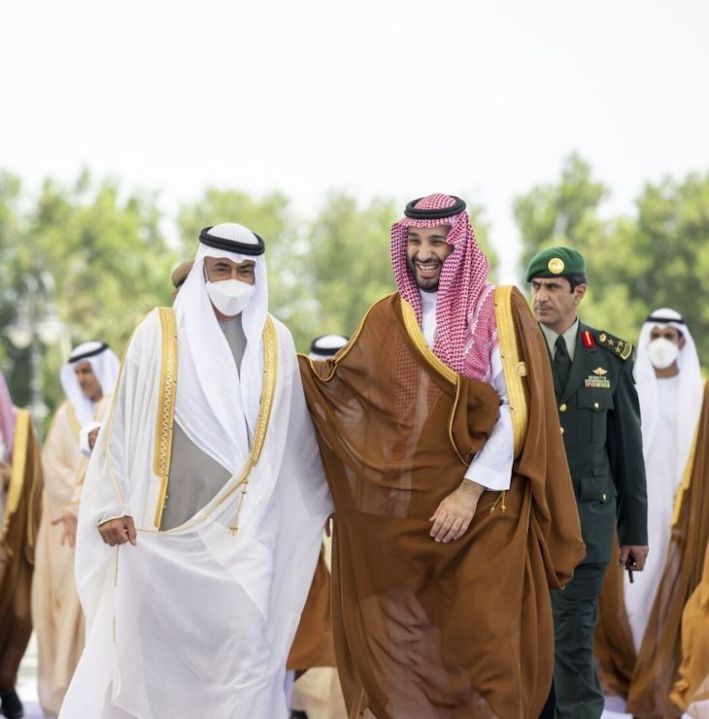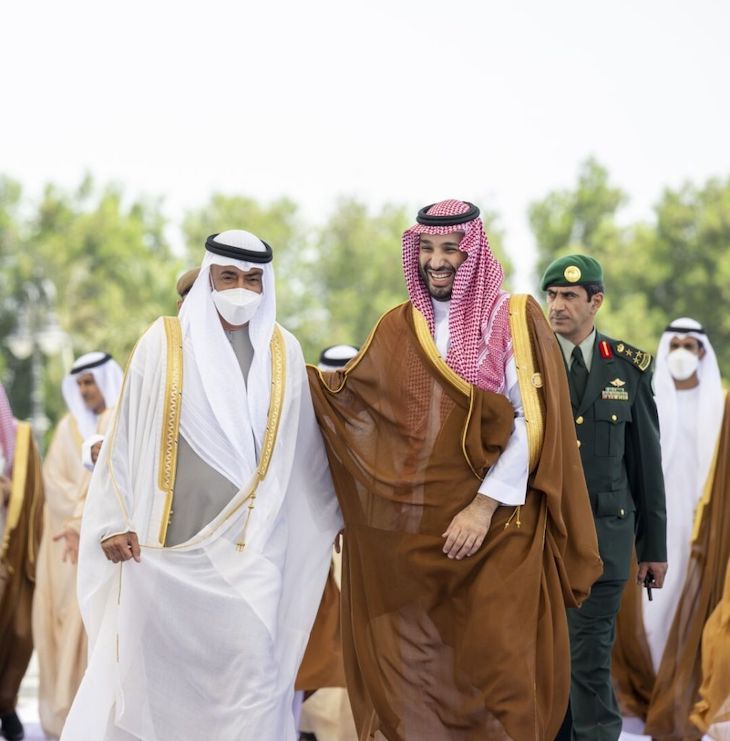On Monday, while IDF troops were clearing the last Hamas terrorists from Israeli communities near the Gaza border, Benjamin Netanyahu promised that ‘we are going to change the Middle East’. Only two Israeli prime ministers have spoken like that before. One was Menachem Begin when he waged war on the PLO in Lebanon in 1982. The other was Yitzhak Rabin when he made peace with the PLO in 1993. Neither fully succeeded, but both reshaped the regional balance.
What Netanyahu understands is that the regional balance is shifting once again. It has moved away from the West vs East bipolar order of the Cold War and on from the brief American unipolar moment that followed. The emerging order is multipolar. After decades of American exception, history is onshoring onto the Eurasian landmass and the Middle East is completing its transition from postcolonial weakness to independent sphere.
The Middle East has long been a chessboard of mutual loathing. As American influence ebbs, the region’s historic patterns are reemerging. The non-Arab powers on its northern and eastern margins, the Turks and Persians, have resumed their imperial efforts to control the fractious Arabs. The Sunni-Shia schism is now expressed in the struggle between two visions of regional integration, one imposed by Iran, the other led by the Gulf Arab states in concert with Israel.
As American influence ebbs, the region’s historic patterns are reemerging
As a result, for the first time in the history of the Israeli-Arab conflict, the leader whose opinion will matter most in Jerusalem won’t be outsiders like the presidents of American or Russia. They will be a pair of Arab princes: Mohammed bin Salman of Saudi Arabia and Mohammed bin Zayed of the UAE, the double act known as MbS and MbZ. With the prospect of a nuclear Iran dominating the region, these two Sunni autocrats are aligning themselves with Israel.
Since the Abraham Accords of 2018, in which the UAE and Bahrain opened relations with the Jewish state, it has been a matter of when, not if, the Saudis would follow.
‘Every day we get closer,’ MbS told a Fox News interviewer last month. To ‘get Israel as a player in the Middle East’ would be ‘the biggest historical deal since the end of the Cold War’. The ‘Palestinian issue’ was ‘very important’, MbS said, but he spoke of ‘a deal that gives the Palestinians their needs’ and would ‘ease the life of the Palestinians’. He did not mention Palestinian statehood.
Following this, Benjamin Netanyahu harmonised on this theme at a press conference with Joe Biden. Israel-Saudi normalisation, Netanyahu said, would ‘go a long way to advance the end of the Arab-Israeli conflict, achieve reconciliation between the Islamic world and the Jewish state, and advance a genuine peace between Israelis and Palestinians’.
In carrying out their attack last weekend, Hamas has used the terrorists’ veto to delay ‘normalisation’. Yet Hamas’ use of Iranian funds and weaponry, and its coordination with Iran’s regional strategy, demonstrate precisely why the Iranian threat has pushed MbS towards an alliance with Israel.
There are also internal factors at work. The Gulf states have survived the Islamist waves that destroyed Iraq and Syria and incapacitated Egypt. Their monarchies float on a lake of oil money, but the wells will eventually run dry. Their populations have a ‘youth bulge’, the kind of demographic challenge and opportunity that tends either towards Malthusian disorder or a one-off boom in productivity. As the balance of the global economy moves rapidly eastwards across Asia, India and China are investing heavily in the Gulf.

Signs of liberalisation such as Saudi Arabia letting women drive cars or the UAE building the Abrahamic Family House, an Abu Dhabi complex containing a mosque, synagogue and church, are not belated triumphs of Western values or a posthumous victory for the War on Terror. MbS and MbZ are trying to future-proof their states for the post-American order and the post-carbon economy. This is about survival and material interest: fending off Iran, making money not war, and using the last decades of the oil age to reboot carbon economies to tech, renewables and leisure.
Neom, the ‘cognitive city’ that MbS is building on a 170-kilometre road across the desert to the Red Sea, looks a lot less fantastical if you see it as a prestigious counterpart to the practicalities of SEA-ME-WE3, the optical submarine cable that connects China and India to the Middle East and Europe, or IMEC, the India-Middle East-Europe Corridor. Announced at the G20 in Delhi in mid-September, IMEC is an alternative to China’s Belt & Road Initiative. Its middle section is a train link from the Gulf ports to the Israeli port of Haifa.
The mullahs in Tehran have a different vision to MbS and MbZ: a Middle East without a Jewish state
The tone and content of the Gulf states’ response to the Israeli-Palestinian conflict has shifted accordingly. MbZ’s foreign minister condemned Hamas this week in language that would have once been unthinkable. Israel bombed Gaza for three days before MbS phoned Mahmoud Abbas of the Palestinian Authority and the Egyptian and Jordanian leaders. The statement released to the Saudi paper al-Arabiya affirmed Palestinians’ ‘legitimate rights’ and the need for a ‘just and lasting peace’ in the region, but MbS made fewer demands of the Israelis than the U.S. State Department, which started pushing for a ceasefire while Israeli special forces were still fighting Hamas’ hostage-takers in Israeli towns.
Arab governments have tired of the Palestinians’ veto over regional progress. Justifying murder in the name of God and blaming the Jews for everything backfired on their own societies. While the Islamists wasted two decades on building IEDs and slitting throats, Israel became a wealthy tech superpower. Like Netanyahu, MbS and MbZ want to ‘shrink the conflict’ between Israel and the Palestinians and grow their power.
Demographic, economic and political realities have lowered the price of Arab recognition of Israel and raised the value of collaborating with their once sworn enemy. The Palestinians’ dysfunction makes it easier to pass them the bill.
The Palestinian ‘rejectionists’ are now funded and armed by Iran. The mullahs in Tehran have a different vision to MbS and MbZ: a Middle East without a Jewish state, with the Arabs, as often in the past, integrated under a non-Arab empire.
Israel’s defence minister Yoav Gallant says that Iran sends $100 million (£81 million) a year to Hamas and tens of millions to Palestinian Islamic Jihad; a fraction of the $700 million (£570 million) Iran sends to Hezbollah in Lebanon, but enough to add the Sunni Palestinian group to Tehran’s play for a Shia empire. The Foundation for Defense of Democracies, a pro-Israel thinktank in Washington, DC, estimates that Iran’s Islamic Revolutionary Guard Corps is funding a ‘network of at least 19 armed groups on Israel’s borders, as well as in the West Bank. Tehran calls this the ‘unity of the arenas’.
The Israel-Iran shadow war has only been running for decades. The Sunni-Shia rivalry is millennial. The pawns in Iran’s game are minor groups like the Houthis in Yemen or Palestinian Islamic Jihad, which has been a boutique Iranian-funded operation for decades. Hamas has grown into a knight or bishop, capable of reshaping the game with a single move — but also worth sacrificing to create an opening for a deadlier move. Hezbollah, which could yet be drawn into this latest conflict, is the rook, an impregnable anchor. If the clerical regime is the king, the queen is the Islamic Revolutionary Guard Corps (IRGC), the elite troops who export the Islamic revolution and monopolise Iran’s economy.
The knight’s gambit is typically played in the middle of the game. A knight is moved up to an empty square and sacrificed for strategic gain. The rockets that Hamas fired at Israeli cities were diversions from the main attack on the empty space where Israel’s standing forces should have been. Israel’s reaction may take Hamas off the board for a while, but Iran has already pocketed the strategic gain. It has also prepared to launch an even deadlier move, when Hezbollah joins the war. That will bring the Israel-Iran endgame much closer.
Israel cannot defeat Hamas in Gaza alone
Netanyahu is promising an outraged Israeli public that the evil of Hamas will now be defeated for good. Victory or defeat, however, will depend on the war behind the war with the Palestinians.
But Israel cannot defeat Hamas in Gaza alone. It is not just that Hamas cannot be expunged, short of levelling Gaza and driving its population into the Sinai Desert. Hamas is sustained by external powers. These include not just Iran and Turkey, which is the patron of the Muslim Brotherhood and its spin-offs, but also Qatar which, by hosting the biggest American military base in the region, the Hamas leadership and the al Jazeera propaganda channel, functions as the Casablanca of the Middle East.
Since 2012, Qatar has funded Hamas with Israel’s consent, first with suitcases of US dollars and then with Egyptian fuel and civil servants’ salaries. In 2018, Netanyahu was widely reported as having told a Likud party meeting that this was their best option for keeping the Palestinians divided between the Palestinian Authority in the West Bank and Hamas in Gaza, a split which prevents the creation of a Palestinian state.
The Israeli right preferred this to negotiating with Mahmoud Abbas in Ramallah, which would rapidly lead to concessions in the West Bank. The Americans liked it because, as the liberal logic goes, giving Hamas ‘equity’ in the here and now will wean them off their pathological visions of the next world. The Gulf Arabs preferred it to Israel doing nothing, which was always Netanyahu’s preferred option. Hamas played along and seems to have lulled Israel into believing that it might exchange its existential war on the Jews for welfare from Qatar and work permits from Israel.
If Hamas is sustained and directed by external forces, then only a shift in the regional balance can contain it and reopen the path to Israeli-Saudi normalisation. The shift in the strategic balance that Netanyahu wants is political and regional, not military and local, and much of it coincides with what MbS wants. Reducing Turkey’s support for Hamas reduces the influence of the Saud dynasty’s enemy, the Muslim Brotherhood. Displacing Hamas from Qatar helps to pull Qatar out of the Iranian orbit.
Hamas is not just an extension of the Muslim Brotherhood or Iranian imperialism. It has its own nationalist and territorial goals too, and it keeps its Sunni options open through its links to Turkey and Qatar. When Anwar Sadat launched the Yom Kippur war in 1973, he wanted to break Israel’s image of invincibility, recover lost territory and, above all, force the Americans to the negotiating table. Perhaps the Hamas leadership in Doha launched their attack on Israel on the 50th anniversary of Sadat’s surprise attack with a similar aim. This time, however, it will not be the Americans alone who redraw the map. Only MbS and MbZ can provide the legitimacy that Israel craves.
Dominic Green is a senior fellow at the Foreign Policy Research Institute and was editor of The Spectator’s world edition








Comments